After a short while, the wheels of the plane rudely touched down in Baku and yanked me from an uncomfortable sleep. As the dimmed lights from the ceiling burned through my dry eyes, awareness of my surroundings gradually came back. I found myself in a seat of a plane. People around me were gathering their things while the plane slowly rolled through the runway dotted with bright orange lights. Some lo-fi music was playing quietly from the ceiling. From all this, it was clear that the plane had landed, and that I had arrived in Azerbaijan.
I might have pushed myself too hard by spending an entire day exploring Tashkent before catching the flight. I hadn’t had proper rest or even taken a shower since leaving Samarkand. But I couldn’t help it. For every day that passed, my obsession with reaching Dublin on time only grew. How long could I afford to stay in Baku? I was thinking I could just spend one day to save time. But Kostya’s suggestion from the night train ride in Uzbekistan echoed in my head: “One day in Baku? I think that’s too short. You will need a couple of days to see Baku.” So I was open to the idea of staying a bit longer. But first, I needed to wait for the sun to come up. It was barely past five in the morning and the darkness outside was still impenetrable.
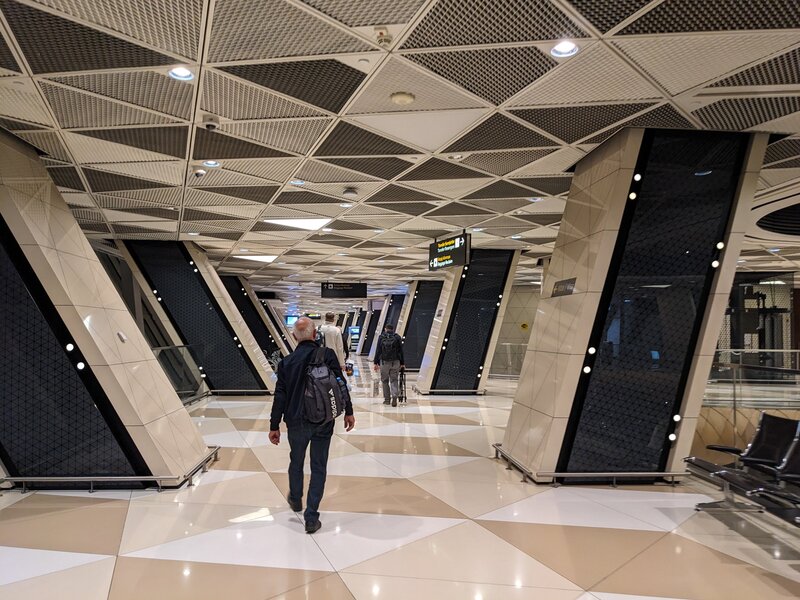
At this hour, only emptiness prevailed in the sleek airport hallways surrounded by abstract and modern designs. After the crowd from the plane had gone on their separate ways, the airport felt so empty that even the overwhelming silence wasn’t enough to fill the vacuum. I roamed the empty terminal looking for a place to sit down and rest until the sun came up. I eventually set down my backpack on an empty bench near some closed departure gates. A few travelers were sleeping or resting nearby in the oppressive emptiness that lingered in the night airport. As I got busy looking at the map and picking out places to visit, an incessant scrape broke the silence. An old man was trying to charge his phone from a power outlet behind me, but his cable wouldn’t fit into his phone. I didn’t have any spare cable and needed to charge up my electronics too. So I suggested to him that we take turns using my USB cable. He thanked me and sat down nearby after plugging in his phone. Soon we started exchanging a few words and got to know each other. We discovered that we both spoke Russian and switched into it.
The old man’s name was Ivan and he was from Ukraine. He said that he used to drive trucks in Kharkiv but was out of work due to the ongoing war. Ivan was here to visit his son who lived in Azerbaijan and was waiting for the daylight before heading into the city. “Ty zdes’ ranshe byval?” Ivan asked (“Have you been here before?”). “Nyet, pervi raz. Prosto puteschestvovat” (“No, first time. Just travel”). “Baku krasivyy. Obyazatel’no posmotri gorod” (“Baku is beautiful. Be sure to check it out”). He asked where I was going next, and I explained my plan to reach Dublin. Ivan listened with interest. While we were busy talking, the dawn started slowly breaking. Ivan’s phone was all charged up, and I plugged in mine to prepare to leave for the city soon. I wasn’t sure where to even go but had found a hostel near the center. I thought I’d just walk in, drop my backpack, and start exploring the city. Ivan helped me buy a ticket to the city, and we both hopped on the bus, leaving the impeccably modern airport behind. The morning was shaping up to be a cloudy one.
Although the bus was going straight toward the city center, I ended up getting off at Koroglu station which was two thirds of the way. It was partly because the map showed it was faster to take the subway into town. But the main reason was that I wanted to check out the subway system of Baku. I wondered whether it was going to be as epic as the Tashkent metro, and what kind of regional touches were added on top of the Soviet monumentalism. The bus was getting more and more crowded, and I couldn’t even see Ivan or say goodbye to him before hurriedly hopping off to beat the huge line of oncoming passengers.
When I walked up to the metro station, I was greeted by its modern and abstract facade fully covered with glass. The platforms and underground passages were just as stylish. The kind of over-the-top aesthetics that abounded in Tashkent metro were nowhere to be found. But as I looked around the platform, I realized that the absence of Soviet architecture was actually the least of my worries. It turned out to be a weekday, and the morning rush hour traffic was filling up the platform. When a subway train arrived and its doors opened, hardly anyone could get on because the car was already full. There was simply no way I could squeeze in with my giant backpack. After letting a couple of trains pass, I gave up and took a bus to the city instead.
The rush hour bus toward the city wasn’t much better than the subway but at least I could fit myself in. The passengers glanced curiously at the scruffy backpacker at first but soon went about their business. The bus traveled in silence for about half an hour to reach the city center. My first impression of the city was that the streets were so calm and tidy. After coming from a more chaotic and lively Central Asia, the calm took some getting used to. I strolled past charming brick buildings and walked into a hostel that I had found this morning at the airport. There were actually a few other hostels in the area, but I just picked a random one because I was too tired. The owner was nice about my early arrival and allowed me to drop off my backpack. There was hardly anyone in the common area as everyone was probably asleep. So I headed back out to the streets to check out the city a little more. Since I might have only one day in Baku, every moment was precious.
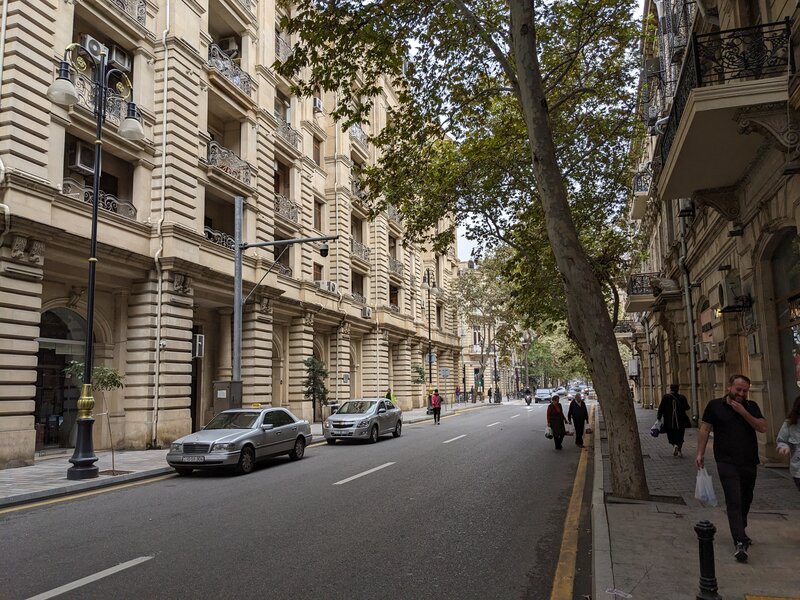
Near the city center was a park that stretched for miles along the shoreline. There was hardly anyone around, and the place was roaring with the strong wind from the sea. It was only later that I learned of Baku’s moniker, the city of winds. This passionate wind was speaking of Baku’s character in the most fitting way, but I had no way of knowing this at the time. Beyond the shoreline stretched the Caspian Sea, whose sheer size I couldn’t readily comprehend. How far would I have to swim or sail to reach the part of the world that lay beyond? I stopped and stared at the sea, far into the direction from which I had come. The salt-laced wind suddenly felt bitter, as I faced the sea which had always been an unsolvable puzzle in my trip to cross from Asia to Europe. No matter how I looked at it, there just didn’t seem to be a way to cross it by ferry or get around it. But what if I was merely making an excuse? The unrelenting wind and the waves were daring me to cross the sea one day. I gave in to its daring proposition and hoped someday I would discover what lay beyond the water, the deserts, and the mountains in the distance unknown.
When I turned away from the winds that were drying my eyes, the iconic flame towers were standing far away on top of the hill under the gray sky. Since I didn’t have any particular place to be, I started walking toward them. But the walk didn’t last long. Only a few minutes in, I realized that my legs were so heavy and my mind was as cloudy as the sky above me. My fatigue was finally hitting me like a ton of bricks. Constantly moving for the last few days was rough but doable, but the straw that broke the camel’s back was catching the red-eye flight last night and practically getting almost no sleep. I kept sitting down on benches along the empty promenade but couldn’t muster up the energy to reach those flame towers on foot. I turned back to the hostel to take a quick nap and recover.
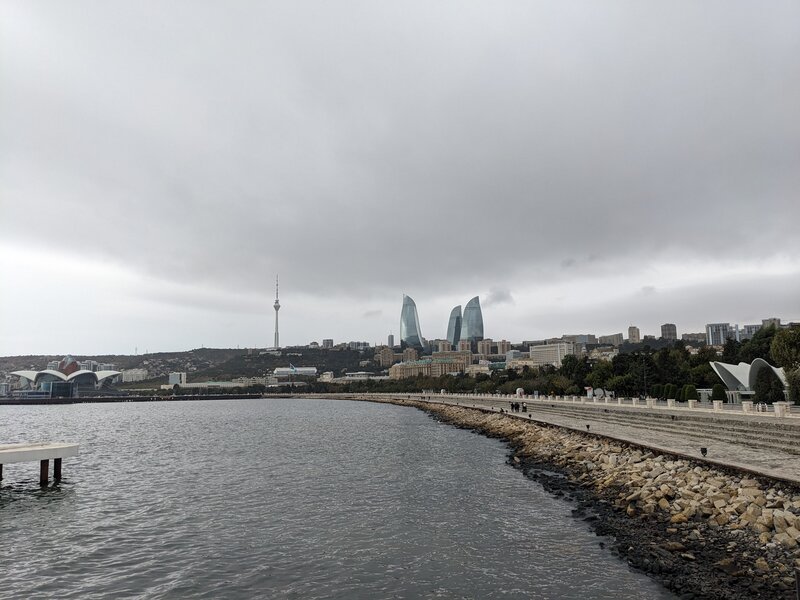
As the fatigue finally hit me like a ton of bricks, my mind felt as cloudy as the gray sky above the flame towers.
After leaving the quiet seafront, I happened to be walking across the old city. There were many old buildings and brick-paved streets. The area seemed too interesting to pass by, no matter how tired I was. So I pushed through and trudged along the beautiful streets of the old city while my heavy legs protested every step. But as I climbed a winding and steep hill of the old town, I wondered whether all my effort was actually worthwhile. All the structures and streets that had just appeared charming and authentic started feeling somewhat artificial. The problem was yet again the perfection. Everything was so carefully packaged and presented in their prettiest form, just as it had been in Uzbekistan. After seeing a certain number of fancy restaurants masquerading as historic landmarks and tour guides trying to persuade me to join their groups, my curiosity dwindled to almost nothing.
My head became much clearer after an hour-long nap. But the mind was still burdened with many urgent questions such as whether I was going to leave Baku the following day, where my next destination should be, and how I was going to get there. Tbilisi sounded like the most likely candidate for my next stop, as it was conveniently on my way west. But there was no longer a direct train there at the time, and I wasn’t sure what the most timely way was to cross into Georgia and get there. What complicated the matter was my unrealistic expectation of visiting other cities on my way to Tbilisi. After all, I still remembered the lessons from the barren steppes of Western China: not to approach life in terms of trade-offs, but instead to do everything that it threw at me. Even with a clearer mind, it was hard to think through it all. I figured I’d worry about it later.
Despite the renewed energy and burgeoning enthusiasm, I couldn’t come up with many ideas for things to do. I had already lost interest in all the perfectly presented streets and pretty buildings around me. Kostya’s suggestion to check out Yanar Dag or the mud volcanos came to mind. But it was already late in the afternoon, and it didn’t seem possible to visit all those places. Then I remembered a picture that Sakoto had sent me the night before. She was one of the Chinese travelers with whom I played Uno at the hostel in Samarkand, and was the one who drew whiskers on my face. I was messaging her while bored out of my wits and half-asleep in the Tashkent airport. She had sent me a message that read, “There are some interesting things in Baku I want to find,” and along with it was a picture of a giant Soviet-era mural depicting astronauts ascending to space. I had forgotten about it, but realized that trying to find that piece of art would be a bit more interesting than walking and taking pictures of the city’s immaculately presented streets.
My search began in the Heydar Aliyev Center whose imaginative and curvy white walls were gleaming under the bright afternoon sky that was finally clearing up. That thoroughly modern structure seemed to be the furthest thing from any Soviet murals. If that mural existed at all, it must have been at home on the side of some five-story concrete apartment building. But downtown Baku didn’t show even the slightest hint of the region’s Soviet past. Instead, the buildings and streets were screaming something modern and abstract, as if to prove a point. The locals also didn’t know where the random mural could be found in Baku. Some police officers simply asked me in return, “Musei? Kak nazyvayetsya etot muzei?” (“Is this a museum? What’s the museum called?”), assuming it was some display at a museum. A cyclist and a taxi driver tried to help me out, debating at length about where it could possibly be. They were smiling the whole time, probably wondering why this tourist wouldn’t just go into Heydar Aliyev Center like he was supposed to. They asked me whether I was completely sure it was in Baku, and told me that, if it were really in Baku, it would be near the old town or one of the museums near there. I made my way back to the old town.
The traffic was really bad and when I arrived in the old town, all the fancy museums were closed. Disconcerted, I walked around the nearby neighborhoods looking for places where the mural might be. There were none. Everything was so modern and stylish and had no room for relics from the past. It was not until later that someone told me that I would have to go to the far outskirts of Baku to see the kind of five-story Soviet apartment buildings or murals.
When I was walking in a quiet street, there was a local kid kicking a soccer ball alone against the wall. “Pass, pass!” I called out as I ran toward him. We didn’t exchange any words, but for the next few minutes we passed the ball around. I was pretty lousy and kept missing the target. The kid, on the other hand, had some skills and was pulling off some clever tricks. When I was finished with it, I felt that my time in Baku was done. The beautiful city of Baku had much more to offer, but my eccentric distaste for everything that was perfect didn’t allow me to appreciate what the city had in store. Still, I decided to give it one more day to check out Yanar Dag and the mud volcanos as Kostya suggested. When I got back to the hostel that evening, Sakoto and her friends had messaged me that they had arrived in Baku as well. “We can meet in Baku,” she said. “By the way, are you sure that mural is in Baku? I wanna find it but couldn’t,” I wrote, tongue-in-cheek. “Yes I am sure,” the answer went, “maybe tomorrow we can find it together.” I wasn’t sure that there would be enough time to hunt for the mural the following day. It looked like the mystery of the mural would have to remain unresolved.
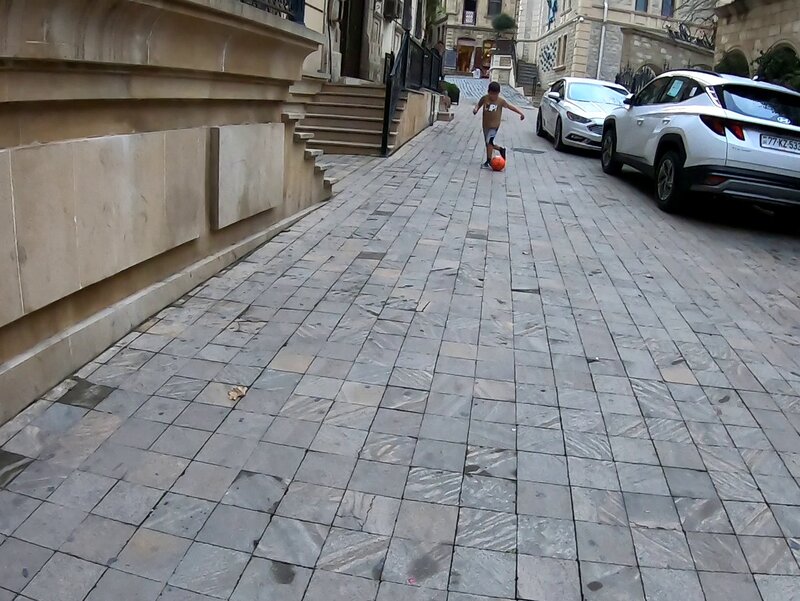
The evening was settling on the pretty streets of Baku. It was finally the time to deal with the problem that I had been putting off all day: where would I go next? Overwhelmed by the gravity of the question, I went into the dorm room to get my laptop to start doing some research. While I was sorting out my belongings, a fellow traveler and I randomly started chatting. We talked about our impressions of Baku, and how long we had been in the city.
From the way he spoke, I thought he might be from Korea but wasn’t too sure. Eventually, the traveler dropped a question: “Where are you from?” and we discovered that we were both Koreans. So I initiated the awkwardly timed switch to our native language, which was a bit strange at first but certainly broke the ice. The traveler’s name was Gunn and he too had just arrived in Baku this morning. Actually, it turned out that we were both on the same 3:20AM flight from Tashkent. “Wait, aren’t you tired?” we asked each other and realized that we both knew the answer all too well.
Gunn had an interesting story that somehow resonated with mine. For many months, he had been traveling toward his final destination of Vienna to see the Christmas market. Compared to his trip of epic proportions, my rushed campaign toward Dublin felt almost too casual. But our footsteps were still mirrored, though in different places and timelines. In the lonely pursuits of the places that beckoned us, our paths happened to coincide in that fleeting moment. Intrigued by the coincidence that intertwined our paths, I wanted to ask Gunn why he was headed toward the Christmas market, of all the places in the world. But I was rather reluctant about burdening the conversation with a subject that I feared could spiral into something quite philosophical. After all, I myself didn’t know the reason that I was headed to Dublin or what it all meant. For the first time, this lack of clarity started to bother me. I wondered whether it was similar for Gunn.
As we were talking about what our plans were in Baku, Gunn said, “I’m going on a tour to check out Yanar Dag, the mud volcanos, and a few other places.” “Oh, really?” I exclaimed, “I was going to check them out tomorrow.” Gunn said that he had found a tour guide that would take a group of people through a bunch of places that lay outside Baku. Gunn said he himself didn’t usually join guided tours either, but was giving it a chance because it was probably the most economical use of time since he was also leaving Baku soon. It was pretty hard to argue with that logic, given my dilemma of fitting seemingly infinite places into a limited timeline. I decided to embrace the conveniently packaged and served experience that I was quick to dismiss, and join forces with Gunn to explore the outskirts of Baku. Sakoto and her friends weren’t too sure about joining us, but said that they were also probably going to leave Baku for Georgia in two days.
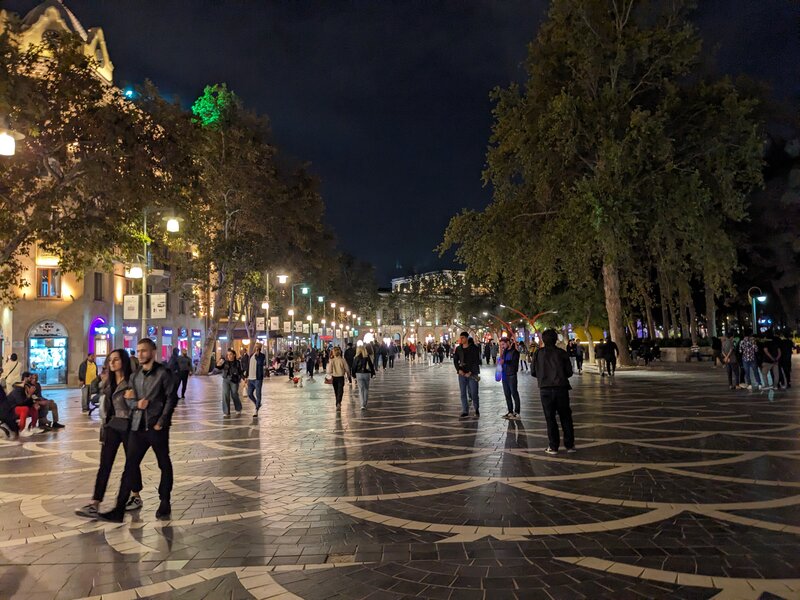
When I walked outside to get some dinner, the sky was already dark and the autumn night had fallen on the pretty streets of Baku. On the avenues and squares whose names I didn’t know, I tried to blend into the nightly crowds. Suddenly, a realization hit me that everything here took on a slightly different touch from that in Central Asia. As I slowly made my way farther west, the architecture, the appearances of people, the temperature, and even the smell of the autumn air were again all changing. It was the first time since passing through Xinjiang that I observed such a noticeable jump. On this side of the Caspian Sea, mosques were still mosques, buildings were still buildings, and people were still people but all in slightly different ways. The change in the surroundings was a welcome sign that I was at least traveling in the right direction. An open question was whether I could move fast enough. At this thought, I returned to the hostel to start finding transportation for the next steps.
For the next few hours, I went through many possible combinations for my next destinations and tried to make them fit together in the remaining eleven days. I concluded that it would be far better to head straight to Tbilisi without stopping at other cities. The reason was that the route from Istanbul to Dublin turned out to be not as straightforward as I hoped it would be. The biggest hurdle was that the train ticket from Istanbul to Sofia couldn’t be booked online in advance. Rather, I had to go to a ticket office at a train station in Istanbul in person and hope that the tickets were still available. The road onwards from Bulgaria was equally uncertain. Given all these moving parts, it appeared to be the best course of action to head to Istanbul as fast as I could. So I booked a train ticket from Baku to Aghstafa, a town in the western part of Azerbaijan which was 500km (310mi) away from Baku. Although it was still 100km (60mi) away from Tbilisi, it was the closest to Georgia I could reach by train. I didn’t have a particular plan for what would happen next, but figured I’d work something out once I got to Aghstafa. Explore the outskirts of Baku tomorrow, then leave for Tbilisi the day after–that sounded like a good plan.
Later in the evening, Gunn came over to the tiny corner table where I was immersed in the planning. The loud noise of a nearby washing machine filled the bleak space. We got talking again and the subject naturally drifted to our upcoming plans. Gunn was keen on getting to Sheki, a town also located near the Georgian border in the western part of Azerbaijan. When I told him that I was leaving for Tbilisi on the day after tomorrow, Gunn was rather surprised that I was leaving Azerbaijan so soon. It was then that I explained my plan to reach Dublin in the next eleven days. Gunn thought about the plan for a bit, and said rather incredulously, “Bro, that might not work out.” I admitted that I was honestly just scrambling toward Istanbul and hoping for the best. As a fellow traveler, Gunn spoke with genuine care, trying to explain why the plan wasn’t realistic. I knew well that he was correct, but I wasn’t prepared to listen to the voice of reason. Sometimes we just want to take a leap of faith.